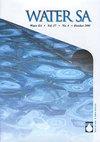Adsorptive removal of BTEX compounds from wastewater using activated carbon derived from macadamia nut shells
IF 1.2
4区 环境科学与生态学
Q4 WATER RESOURCES
引用次数: 1
Abstract
In this study, adsorptive removal of benzene, toluene, ethylbenzene and xylenes (BTEX) from synthetic water using activated carbon adsorbent derived from macadamia nut shells was investigated. The surface functional groups of the synthesized adsorbents were assessed by Fourier transform infrared spectra. The specific surface area, pore size and pore volume at 77 K nitrogen adsorption, surface morphology, and the crystalline structure of the adsorbents were determined using Brunauer-Emmett-Teller, scanning electron microscopy and x-ray diffraction, respectively. Batch adsorption mode was used to evaluate the performance of the activated carbon. The stock solutions of synthetic wastewater were prepared by dissolving 100 mg/L of each of the BTEX compound into distilled water in a 250 mL volumetric flask. Effect of initial concentration of BTEX compounds, contact time, and mass of adsorbent on the removal of BTEX compounds from the synthetic wastewater was investigated. The macadamia nut shell–derived activated carbon (MAC) proved to be an effective adsorbent for BTEX compounds, with a large surface area of 405.56 m2/g. The exposure time to reach equilibrium for maximum removal of BTEX was observed to be 20 min. The adsorption capacity of the BTEX compounds by MAC followed the following adsorption order: benzene > toluene > ethylbenzene ˃ xylene.用源自夏威夷坚果壳的活性炭吸附去除废水中的BTEX化合物
研究了以澳洲坚果壳为原料制备的活性炭吸附剂对合成水中苯、甲苯、乙苯和二甲苯(BTEX)的吸附去除。利用傅里叶变换红外光谱对合成吸附剂的表面官能团进行了表征。采用brunauer - emmet - teller、扫描电镜和x射线衍射分别测定了吸附剂在77 K氮气吸附时的比表面积、孔径和孔体积、表面形貌和晶体结构。采用间歇吸附方式对活性炭的性能进行了评价。制备合成废水的原液,将每种BTEX化合物100 mg/L溶于250 mL容量瓶中的蒸馏水中。考察了BTEX化合物的初始浓度、接触时间和吸附剂质量对合成废水中BTEX化合物去除率的影响。夏威夷果壳活性炭(MAC)具有405.56 m2/g的表面积,是一种有效的BTEX类化合物吸附剂。观察到达到最大去除BTEX平衡的暴露时间为20 min。MAC对BTEX化合物的吸附量顺序为:苯>甲苯>乙苯_二甲苯。
本文章由计算机程序翻译,如有差异,请以英文原文为准。
求助全文
约1分钟内获得全文
求助全文
来源期刊

Water SA
环境科学-水资源
CiteScore
2.80
自引率
6.70%
发文量
46
审稿时长
18-36 weeks
期刊介绍:
WaterSA publishes refereed, original work in all branches of water science, technology and engineering. This includes water resources development; the hydrological cycle; surface hydrology; geohydrology and hydrometeorology; limnology; salinisation; treatment and management of municipal and industrial water and wastewater; treatment and disposal of sewage sludge; environmental pollution control; water quality and treatment; aquaculture in terms of its impact on the water resource; agricultural water science; etc.
Water SA is the WRC’s accredited scientific journal which contains original research articles and review articles on all aspects of water science, technology, engineering and policy. Water SA has been in publication since 1975 and includes articles from both local and international authors. The journal is issued quarterly (4 editions per year).
 求助内容:
求助内容: 应助结果提醒方式:
应助结果提醒方式:


